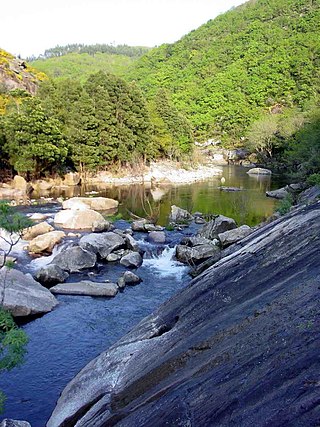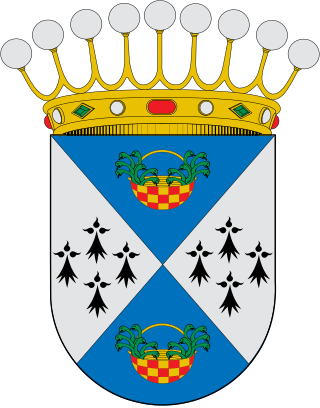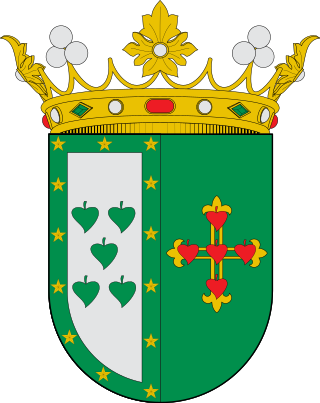
Duke of Berwick(Spanish: Duque de Berwick) is a title that was created in the Peerage of England on 19 March 1687 for James FitzJames, the illegitimate son of James II and VII, King of England, Scotland, and Ireland and Arabella Churchill. The title's name refers to the town of Berwick-upon-Tweed in England, near the border with Scotland.

Duke of Ciudad Rodrigo is a hereditary title in the Peerage of Spain, accompanied by the dignity of Grandee. It was conferred by King Ferdinand VII on the British General Arthur Wellesley, then 1st Viscount Wellington, later 1st Duke of Wellington, in 1812, after his important victory at the Siege of Ciudad Rodrigo that same year, as a victory title. As all dukedoms but one in the peerage of Spain, it has Grandeeship attached.
Count of Olocau is a title of the Spanish nobility. Olocau is located in the Spanish province of Valencia.

The Marquessate of Samaranch is a hereditary title of Spanish nobility. The title was bestowed by King Juan Carlos I of Spain on Juan Antonio Samaranch on 30 December 1991, honouring his efforts in support of the Olympic movement as President of the International Olympic Committee.
Marquisate of Casa Real is a title of the Spanish nobility.

The County of Trastámara was a tenancy of the crown in the Kingdom of Galicia in the Middle Ages. Its name comes from the Latin tra(n)s Tamar(is), meaning "beyond [north of] the Tambre", a river which runs through Galicia. It was regularly granted to men of a single family, the House of Traba from the 11th century into the 13th, after which it was often given for life to others, including Alvar Núñez Osorio and the future King Henry II of Castile, whose dynasty is thus known as the House of Trastámara. On 4 February 1445 in San Martín de Valdeiglesias, it was granted as a hereditary possession to Pedro Álvarez Osorio by Juan II of Castile.

Count of Teba is a hereditary title in the Peerage of Spain, granted in 1522 by Charles I to Diego Ramírez de Guzmán, son of the 1st Lord of Teba. The name makes reference to the municipality of Teba, in Málaga, Spain.

Count of Cabra is a Spanish noble title created by King Henry IV of Castile on 2 November 1455 for Diego Fernandez de Cordova and Montemayor, 1st Viscount of Iznájar. The titleholder is a Grandee of Spain, the third oldest such title in Spain.

Marquess of Urquijo is a noble title in the peerage of Spain accompanied by the dignity of Grandee of Spain, bestowed on Estanislao de Urquijo y Landaluce by King Amadeo I on 13 May 1871.

Marquess of Guadalcanal is a hereditary title of Spanish nobility. It was created on 11 July 2008 by King Juan Carlos I of Spain in favor of Antonio Fontán Pérez, journalist and politician.

The Marquessate of Barboles is a Spanish nobility title created by King Philip IV, on March 20 of 1647, in favor of Juan Ximénez-Cerdán and Fernández de Heredia, that belonged to the house of Juan Ximénez de Cerdán (1355–1435). It is associated with the Zaragoza town of Bárboles. The XIV Marchioness María del Pilar Benítez y Guadarrama succeeded to the marquisate in 1986 with grandeship of Spain after 1987.

Count of Latores is a hereditary title of Spanish nobility. It was created on 30 April 1992 by King Juan Carlos I of Spain in favor of Sabino Fernández Campo, Head of the Royal Household of Spain under King Juan Carlos I, from 1990 to 1993. The title is accompanied by the dignity of Grandee of Spain.

Marquess of Daroca is a hereditary title of Spanish nobility. It was created on 1 December 2011 by King Juan Carlos I of Spain in favor of Antonio Mingote, a cartoonist, writer and journalist. The title recalls the name of his hometown, the town of Daroca.

Dukedom of Maura is a hereditary title of Spanish nobility. It was created on 19 June 1930 by King Alfonso XIII of Spain in favor of Gabriel Maura Gamazo, historian and politician.
José Manuel de Zuleta y Alejandro, 14th Duke of Abrantes, GE, is a Spanish aristocrat and senior Spanish Army officer who served as Private Secretary to Queen Letizia from 2014 to 2024.

Marquess of Dávila is a hereditary title of Spanish nobility. It was created on 18 July 1949 by Francisco Franco in favor of Fidel Dávila Arrondo, Spanish general.

Marquess of Kindelán is a hereditary title of Spanish nobility. It was created on 1 October 1961 by Francisco Franco in favor of Alfredo Kindelán Duany, Spanish general.

Dukedom of Zaragoza is a hereditary title of Spanish nobility. It was created on 17 July 1834 by Queen Isabel II of Spain in favor of José de Palafox, a Spanish general. The title is accompanied by the dignity of Grandee of Spain.

Marquess of Murrieta is a hereditary title in the peerage of Spain, bestowed on Luciano Murrieta, a Peruvian-born military officer and viticulturist, by King Amadeo I on 20 October 1872.

Marquess of Oró is a hereditary title of Spanish nobility. It was created on 23 June 2003 by King Juan Carlos I in favor of Joan Oró, Spanish biochemist.


















